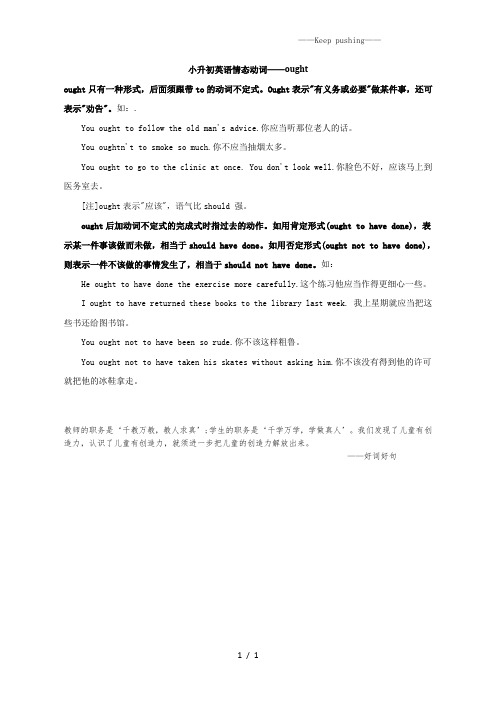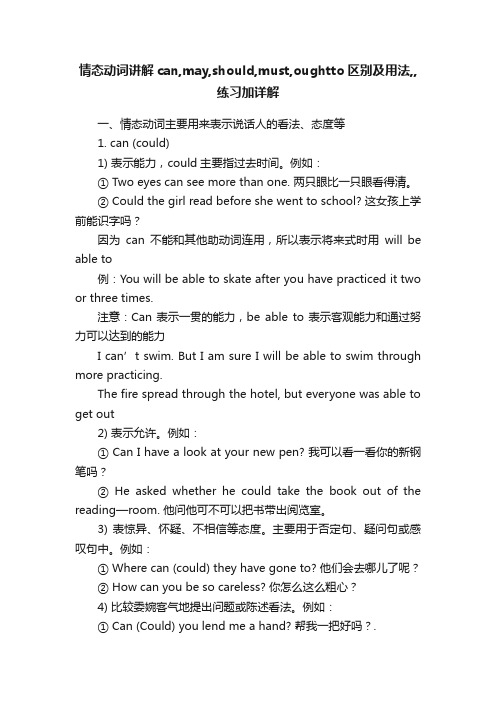人教新课标小升初英语情态动词——ought
oughtto的疑问句句式

oughtto的疑问句句式Ought to的疑问句句式一、Ought to的含义Ought to是英语中的一种情态动词,表示“应该”、“应当”。
它与should 的意义相似,表示义务、建议或道德义务。
在英语中,ought to后面要接动词原形,同时也可以构成疑问句的句式。
二、Ought to的疑问句句式1. Basic question form(基本疑问句形式):- Ought I to go to the party tonight?(我今晚应该去参加聚会吗?)- Ought he to confess his mistake to her?(他应该向她坦白他的错误吗?)- Ought we to study harder for the exam?(我们应该为考试更加努力学习吗?)- Ought they to follow the rules?(他们应该遵守规则吗?)2. Negative question form(否定疑问句形式):- Oughtn't I to help my parents more often?(我不是应该更经常帮助我的父母吗?)- Oughtn't he to take a break from work?(他不是应该休息一下吗?)- Oughtn't we to be more considerate to others?(我们不是应该对他人更加体贴吗?)- Oughtn't they to stop wasting time?(他们不是应该停止浪费时间吗?)3. Using "should" instead of "ought to"(应使用“should”代替“ought to”的情况):- Should I go to the party tonight?(我今晚应该去参加聚会吗?)- Should he confess his mistake to her?(他应该向她坦白他的错误吗?)- Should we study harder for the exam?(我们应该为考试更加努力学习吗?)- Should they follow the rules?(他们应该遵守规则吗?)三、Ought to的使用场景Ought to常用来表达道义上的义务和责任,通常用于建议或提醒。
ought,should,must,have to,need的区别

ought,should,must,have to,need的区别ought的各种形式ought是情态动词。
ought没有其他形式,可用于现在时以及将来时。
用于过去时则位于动词过去式之后或不定式的完成式之前:I ought to write to him today/tomorrow.我今天/明天应该给他写封信。
I knew I ought to write to him.我那时知道我应该给他写封信。
She said I ought to write.她说我应该写。
I know/knew that I ought to have written.我知道/那时知道我该写的。
否定式:ought not/oughtn't疑问式:ought I?等否定疑问式:ought I not?/oughtn't I?等ought与带to的不定式连用。
为了提醒学生这一点,常称之为ought to。
问句或话语中用ought to的时候,可以用should来回答;用should的问句或话语也可以用ought to回答:—You ought to put in central heating.—Yes,I suppose I should.—你应该装上暖气。
—是的,我应该装。
should的各种形式should也是情态动词。
与ought的各种形式相同,should可用于现在时以及将来时。
如位于动词过去式之后时,也可以用于过去时。
在上文的各例句中should可代替ought to使用。
否定式:should not/shouldn't疑问式:should I?等否定疑问式:should I not?/shouldn't I?等should后面带没有to的不定式(即动词原形)。
should和ought用于表示义务时通常意思是同样的,但should 是较为常用的形式。
在会话中should/ought to常可单独使用,此时动词不定式省略而不说出:—You should paint/ought to paint your door.—Yes,I know I should/I know I ought to.—你应当油漆—下你的门。
知识讲解 情态动词ought to

情态动词ought to编稿:张桂琴审稿:梁晓概念引入Such things ought not to be allowed. 这类事不该容许。
He said I ought to write an article about it. 他说我应当写一篇文章谈这事。
I ought to be fit for work next month. 下个月我想必可以工作了。
I don’t think you ought to have done that. 我想你不应该这样做的。
语法讲解ought to的用法讲解ought to是一个比较奇怪的情态动词,因为其他所有情态动词都后接动词原形,而ought to 虽然也是后接动词原形,但却无意中构成了ought to do sth结构,其中的to do sth.便是一个典型的带to不定式,并且ought to do sth在用法上也是基本上将ought与to do sth分开使用——如构成疑问句,只需将ought提前,而不是将ought to提前;构成否定式时,是在ought后面加上not,而不是在ought to的后面加not。
如:Ought I to tell her the truth? 我应该把真实的情形告诉她吗?We ought to be careful,oughtn’t we?我们应该小心,对吧?Oughtn’t he to see a doctor?他是不是该去看医生?You oughtn’t to stay out so late.你不应当在外面待到这样晚。
在美国英语中,ought to用于否定句和疑问句时可将其中的to省略。
如:Ought we (to) have done it? 我们本该做此事吗?但是,肯定句中的to通常是不会省略。
另外,在简略答语中,有时也可以省去to。
如:—Ought he to go with us? 他应该同我们一起去吗?—Yes, he ought (to). 对,应该一起去。
小升初英语情态动词ought

——Keep pushing——小升初英语情态动词——oughtought只有一种形式,后面须跟带to的动词不定式。
Ought表示"有义务或必要"做某件事,还可表示"劝告"。
如:.You ought to follow the old man's advice.你应当听那位老人的话。
You oughtn't to smoke so much.你不应当抽烟太多。
You ought to go to the clinic at once. You don't look well.你脸色不好,应该马上到医务室去。
[注]ought表示"应该",语气比should 强。
ought后加动词不定式的完成式时指过去的动作。
如用肯定形式(ought to have done),表示某一件事该做而未做,相当于should have done。
如用否定形式(ought not to have done),则表示一件不该做的事情发生了,相当于should not have done。
如:He ought to have done the exercise more carefully.这个练习他应当作得更细心一些。
I ought to have returned these books to the library last week. 我上星期就应当把这些书还给图书馆。
You ought not to have been so rude.你不该这样粗鲁。
You ought not to have taken his skates without asking him.你不该没有得到他的许可就把他的冰鞋拿走。
教师的职务是‘千教万教,教人求真’;学生的职务是‘千学万学,学做真人’。
我们发现了儿童有创造力,认识了儿童有创造力,就须进一步把儿童的创造力解放出来。
情态动词讲解can,may,should,must,oughtto区别及用法,,练习加详解

情态动词讲解can,may,should,must,oughtto区别及用法,,练习加详解一、情态动词主要用来表示说话人的看法、态度等1. can (could)1) 表示能力,could主要指过去时间。
例如:① Two eyes can see more than one. 两只眼比一只眼看得清。
② Could the girl read before she went to school? 这女孩上学前能识字吗?因为can不能和其他助动词连用,所以表示将来式时用will be able to例:You will be able to skate after you have practiced it two or three times.注意:Can表示一贯的能力,be able to表示客观能力和通过努力可以达到的能力I can’t swim. But I am sure I will be able to swim through more practicing.The fire spread through the hotel, but everyone was able to get out2) 表示允许。
例如:① Can I have a look at your new pen? 我可以看一看你的新钢笔吗?② He asked whether he could take the book out of the reading—room. 他问他可不可以把书带出阅览室。
3) 表惊异、怀疑、不相信等态度。
主要用于否定句、疑问句或感叹句中。
例如:① Where can (could) they have gone to? 他们会去哪儿了呢?② How can you be so careless? 你怎么这么粗心?4) 比较委婉客气地提出问题或陈述看法。
例如:① Can (Could) you lend me a hand? 帮我一把好吗?.② I’m afraid we couldn’t give you an answer today. 恐怕我们今天不能给你答复。
【教育资料】常用情态动词 should,ought to表示应该学习专用

常用情态动词should/ought to表示应该should/ought to表示“责任”,通常解释为“应该”。
比如:We should/ought to be strict with ourselves in our work. 我们在工作中应该严格要求自己。
Staff should/ought to clock in on arrival.员工到达时应该打卡记时。
They should not/ought not to leave toda y’s work until tomorrow.他们不应该把今天的工作拖到明天去做。
You should/ought to t ake care of her.你应该好好照顾她。
一、选择填空。
7. As a rule, nobody ___ take any of the newspapers out of the reading room. You ___ put them back on the shelves.A. must, mayB. would, needC. can, mustD. hast to, might8. ——Mum, ___ I leave the table now? I want to play in the garden with Tim.A. shouldB. needC. mustD. may参考答案:7-8: CD二、分析句子的语法结构,并译成中文。
After the waters had receded and the sun finally made an appearance, Ken Kirioka was contemplating the personal cost of the heaviest rainfall Japan has experienced in more than three decades.【The Guardian】。
情态动词shall,should,ought to用法

情态动词shall,should,ought to用法一、shall 的用法1.在疑问句中用于征求对方意见,主要用于第一人称(在英国英语中,也用于第三人称),其意为“要不要”、“…好吗”。
如:Shall we meet again tonight? 咱们今晚要不要再碰碰头?Shall they wait for you? 要不要他们等你?2.在陈述句中表示说话者的允诺、告诫、威胁、命令、规定、必然性等,主要用于第二、三人称。
如:You shall suffer for this. 你会为此事吃苦头的。
(表威胁)That day shall come.那一天一定会来。
(表必然性) You shall hear everything directly you come. 你一来就可听到所有情况了。
(表允诺)注:用于第一人称,则表示决心。
如I shall return. 我一定回来。
(表示决心)二、should 和 ought to 的用法1.表示均表示“应该”、“按理应当”,有时可互换,只是 ought to 语气更重,较多地反映客观,should 则强调主观看法,用于条件句表示“万一”,还有“竟然”之意。
2.谈论现在的情况,后接动词原形;谈论正在进行的情况,后接动词的进行式;谈论过去的情况,后接动词的完成式。
如:He ought not to [should not] do that. 他不应当这样做。
You should [ought to] be listening. 你应该听才对。
He should [ought to] arrived by now. 到现在他们应该已经到了。
3.有时表示推测,语气较肯定,通常是指非常可能的事(因为暗示有一定的事实依据或合乎常理),而与之相比,may, might, could 等则相对较弱,尤其是 might, coul d。
请看1998年一道高考题:“When can I come for the photos? I need the m tomorrow afternoon.” “They _____ be ready by 12:00.”A. canB. shouldC. mightD. need在四个备选项中,A、B和C均表示推测,但A通常不用于肯定句中表示推测,故不宜选;B和C虽均可用于肯定句表示推测,但根据对话情景顾客下午要照片,如果店主中午12点还不能把照片冲洗出来,那么生意肯定难做成,所以店主应用肯定语气较强的should(=应该)来回答顾客,而不是用语气较弱的might(=有可能),即应选B 不选C;至于选项D,它作为情态动词通常不用于肯定句,不能选。
情态动词should, ought to, have to, must

表示“应该”和“必须”的情态助动词should, ought to, have to 与must(1)表示不可逃避的义务或表示“必须”的must。
must通常只用于现在时和将来时,其他时态则用have to代替。
have to比must往往更强调客观的要求或外在的原因:In the play, she must appear in a bright red dress and long black stockings.演出时她必须穿一条鲜红色的裙子和黑色的长筒袜。
Last year in another play, she had to wear short socks and a bright, orange-coloured dress.去年在演另一个剧时,她不得不穿短袜和一件鲜艳的橘红色的衣服。
(2)should 和ought to都可译为“应该”,表示义务、责任或某个正确的行为。
ought to 比should语气略强些,多用于肯定句;疑问句与否定结构则多用should。
与它们相比,must 和have to 的语气要强得多,没有选择余地:must和have to表示“必须”,而should和ought to表示“责任”、“义务”或是“一个正确的行动”。
试比较:I can’t go to the cinema tonight; I must (or have to) write some letters.今晚我不能去看电影,我必须写几封信。
(我没有选择,我必须而且将会写这些信。
)I should (or ought to) do some work tonight, but I think I shall go to the cinema instead.今晚我应当做一些工作,不过我想我会去看电影的。
(对我来说,正确的做法是工作,但是我选择了去看电影。
)(3)had to表示“过去的必须”,表示过去必须做某事。
- 1、下载文档前请自行甄别文档内容的完整性,平台不提供额外的编辑、内容补充、找答案等附加服务。
- 2、"仅部分预览"的文档,不可在线预览部分如存在完整性等问题,可反馈申请退款(可完整预览的文档不适用该条件!)。
- 3、如文档侵犯您的权益,请联系客服反馈,我们会尽快为您处理(人工客服工作时间:9:00-18:30)。
小升初英语情态动词——ought
ought只有一种形式,后面须跟带to的动词不定式。
Ought表示"有义务或必要"做某件事,还可表示"劝告"。
如:.
You ought to follow the old man's advice.你应当听那位老人的话。
You oughtn't to smoke so much.你不应当抽烟太多。
You ought to go to the clinic at once. You don't look well.你脸色不好,应该马上到医务室去。
[注]ought表示"应该",语气比should 强。
ought后加动词不定式的完成式时指过去的动作。
如用肯定形式(ought to have done),表示某一件事该做而未做,相当于should have done。
如用否定形式(ought not to have done),则表示一件不该做的事情发生了,相当于should not have done。
如:
He ought to have done the exercise more carefully.这个练习他应当作得更细心一些。
I ought to have returned these books to the library last week. 我上星期就应当把这些书还给图书馆。
You ought not to have been so rude.你不该这样粗鲁。
You ought not to have taken his skates without asking him.你不该没有得到他的许可就把
他的冰鞋拿走。
第1页/共1页。
